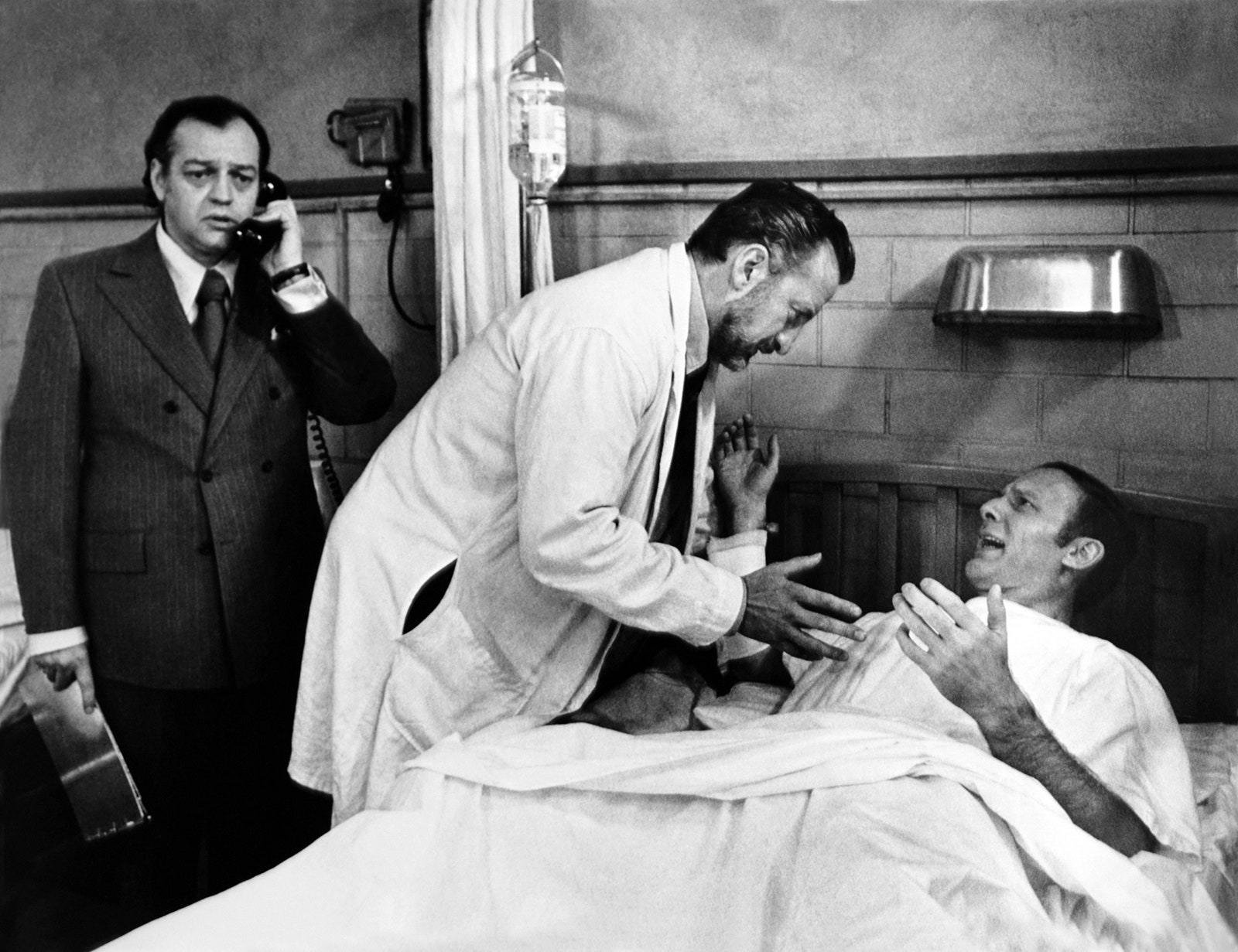The man’s wife had gone to the hospital in agony, suffering from unspecified neurological issues, but she had received only disdain and disregard from medical personnel. As a result, murder was on the mind of Paddy Chayefsky. “Writer Herb Gardner and Chayefsky were walking along a New York street one evening when Paddy turned to him and asked if he knew of a good way to kill off nurses,” author Shaun Considine wrote in Mad as Hell, his 1994 biography of the screenwriter.
That was January of 1970 and the Oscar-winning Chayefsky was not actually planning to solve his problems with homicide. He had a movie idea that would hit back at the medical industry instead. Then best known for 1955’s warm-hearted Marty, and later for 1976’s blistering TV critique Network, Chayefsky was devising a dark satire called The Hospital, in which a series of vengeful killings of hospital staff would underscore the kind of miseries experienced by patients like his wife, Susan. “Susie had been in the hospital, and Paddy was not happy with what went on there,’” Gardner, the playwright of A Thousand Clowns, said in the book. “Nothing got him going like anger. Paddy was always best writing when he was pissed off about something.”
More than a half century later, it appears that rage about the failures of the American medical establishment may have led to a killing that has transfixed the country. Last week, United Healthcare CEO Brian Thompson was shot in the back on an early morning New York City street in what investigators believe was a targeted slaying over the company’s well-documented reputation for denying claims and treatment.
“It felt like something literally out of a movie,” says producer Adrian Askarieh, who has spent years thinking about how killers operate. The film and TV veteran has made two movies based on the assassin video game series Hitman: Agent 47 and is currently developing a TV series based on the character for 20th Century Television. He was at his office, scrolling through social media when he saw footage on Wednesday. “It really resonated with me with regards to real life imitating art and vice versa,” Askarieh says.
He may have been troubled by it, but much of the reaction to the killing has been celebratory, as though a make-believe villain had received comeuppance. The murder became an instant meme on social media—with one popular joke being to mock his fatal bullet wounds as a condition not covered by his insurance.
In the widely circulated surveillance video, a gunman raises a pistol with both hands in a tactical shooting stance, and as he opens fire, the victim collapses against the side of a building. A stunned bystander at a nearby ATM glances around in alarm, then scurries away. The killer does not attempt to stop or harm that individual and barely seems to register this eyewitness to the brazen killing.
The unflappable behavior looked familiar to the Hitman producer. As the victim lies dying on the sidewalk, the shooter casually steps between two parked cars and walks across the street—vanishing from sight. “That [shooter] had just one target, he had one mission, and he very slowly walks up,” Askarieh says. “I found it to be very chilling.”
Richard Dysart, George C. Scott, and Roberts Blossom in The Hospital, 1971.From the Everett Collection.
The footage of the killing called to other stories of precision-minded killers, usually fictitious. NBC’s new The Day of the Jackal, with Eddie Redmayne, follows a gun-for-hire who is known for flawless execution. It’s based on a 1971 Frederick Forsyth novel and 1973 movie adaptation that established the archetype of the exquisitely calm and meticulous assassin—think 1994’s Léon: The Professional, or last year’s sardonic David Fincher drama The Killer, with Michael Fassbender as the nonchalant triggerman. Video games also came to mind, since in addition to the calculated calmness of Agent 47, the killer’s tan hooded coat resembles the costume worn in the Assassin’s Creed games.
Despite being nauseatingly real, the slaying of the United Healthcare CEO had the cadence of those fantasies, right down to the unexpected mercy shown to the innocent onlooker who was in the wrong place at the wrong time. No one has blamed assassin escapism for inspiring this attack, but the similarity may explain why so many have responded as if it’s something to be applauded.
On Monday investigators said they were questioning someone in Altoona, Pennsylvania, and had taken a 26-year-old named Luigi Mangione into custody. Investigators said the motive was likely vengeance over Thompson’s role at United Healthcare. “It does seem he has some ill will toward corporate America,” New York chief of detectives Joseph Kenny said at a press conference. That was clear even before the arrest. The company reportedly rejects more medical claims than other American insurers, and the killer left behind shell casings marked with the words “delay” and “deny,” which mirror terms the industry uses to avoid paying for medical procedures. After the shooting, Jay M. Feinman’s 2010 book Delay, Deny, Defend: Why Insurance Companies Don’t Pay Claims and What You Can Do About It sold out on Amazon and vaulted to the top of its Kindle bestseller lists.
Askarieh felt uneasy seeing it play out. He has recently been trying to ensure that the new TV series scripts add a degree of humanity by underscoring how its antihero has lost his own. “It’s a character that’s looking for redemption, looking to be saved in a way, and I think that component is very helpful in balancing out what he does for a living,” Askarieh said. What the producer saw in the real-life shooting was someone indulging that darkness instead of resisting it. “I want to make sure I’m being very clear, I’m not condoning what happened in New York. I think it was horrific,” Askarieh says. “For a producer like me who works on these things, you kind of feel like you’re desensitized to it but when you see it in real life, it really has an impact. It makes you feel a great sense of responsibility in handling the storytelling the right way so you’re not glamorizing it.”





